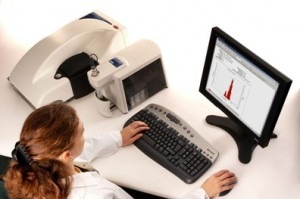
The Zetasizer Nano system from Malvern Instruments has been used to quantify nanoscale characterisation of the environmental sensitivity of novel solubilisation nanoparticles.
A joint research paper has illustrated the application of dynamic light scattering (DLS) to investigate the effects of pH and temperature on the structure and particle size of environmentally responsive Lipodisq systems produced by Malvern Cosmeceutics, UK.
Lipodisqs are designed to mimic naturally occurring high-density lipoproteins that bind cholesterol for transport back to the liver for excretion.
Composed of a phospholipid membrane core bound together into spherical or disc-like structures by a responsive chaperone molecule (a protein that assists non-covalent folding/unfolding), these particles can enclose and transport oil soluble molecules through an aqueous environment.
Used to improve topical delivery of an active botanic or pharmaceutical ingredient, Lipodisqs can be engineered to withstand or respond to particular environmental specifications.
Using the Zetasizer Nano it was demonstrated that Poly(styrene-maleic acid) Lipodisq particles are sensitive to changes in pH, increasing in particle size from 12nm to greater than 200nm over a pH range of 7.7 to 5.7.
The temperature sensitivity of Poly(styrene-maleic acid) Lipodisq particles was also shown with an increase in particle size from around 20nm to 300nm over a temperature range of 20C to 90C.
Both complexes were shown to spontaneously reassemble when these environmental changes were reversed.
Dynamic light scattering (DLS) is a particle sizing technique that delivers rapid, real-time data that are sensitive enough to demonstrate subtle changes over time for sizes below 1nm.
As such, it is particularly suited to the investigation of environmentally triggered particle size changes in topical applications such as creams, gels and lotions.




